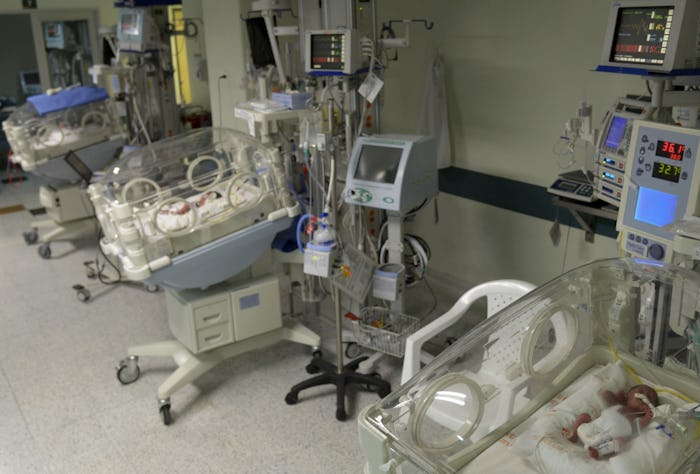Life

Studies On Premature Babies That All Expecting Parents Should Read
Premature babies are surviving birth more and more often, which is fantastic news for parents — but there can also be nothing scarier than seeing one's tiny infant surrounded by machines. For parents who are expecting, the knowledge that one in every 10 babies born before 37 weeks of pregnancy can be a bit frightening — but being prepared will help you ease anxiety and can only work in your baby's favor. With that in mind, there are a few studies on premature babies that all expecting parents should read.
According to the Centers for Disease Control and Prevention (CDC), a premature baby is defined as any baby born before 37 weeks of pregnancy. The earlier a baby is born, the more risks it's exposed to, and babies born before 32 weeks of pregnancy have a higher risk of preterm death. Unless its for essential health reasons, mothers also shouldn't have births induced prematurely (or even after 37 weeks) as long as everything is proceeding normally during their pregnancy.
That said, if parents are prepared for a premature birth, they can make sure to advocate for their baby's care at a hospital, take steps to further ensure their health, and make sure they're part of their child's health care team if they end up facing a premature birth.
Factors Associated With Pre-Term Birth
According to the National Institute of Child Health and Human Development, several studies have found a few risk factors associated with pre-term birth. Women who have had premature births in the past, women carrying twins or triplets, those who have used reproductive technology, and those with certain reproductive organ abnormalities (such as a short cervix) are all considered at high risk for pre-term births. Other factors, such as age, ethnicity, and certain health conditions, also play into parents' risk of pre-term birth. Read the NIH's full summary to learn about factors — including several preventable ones — that affect a mother's risk of pre-term birth.
Premature Babies Do Best On A 100 Percent Breast Milk Diet
According to a study conducted in 2010, premature babies thrive best on a diet made up of 100 percent breast milk. The study noted that receiving human milk reduces premature babies' risk of several short- and long-term diseases, including necrotizing enterocolitis (NEC) and developmental delays. It can also reduce premature babies' chances of being re-hospitalized after leaving the neonatal intensive care unit. For mothers who have given birth pre-term, it's important to get support from lactation consultants and hospital staff. (If mothers can't breastfeed, donated breast milk — not formula — is the next best thing.)
Premature Babies Need Skin-To-Skin Contact
According to a study published in Biological Psychiatry, the effect of skin-to-skin contact between a premature baby and its mother can benefit the child for over a decade after its birth. Premature babies who received skin-to-skin contact with their mothers for an hour daily for two weeks after birth showed better cognitive skills, increased executive abilities, healthier sleep patterns, and improvements in children's autonomic nervous systems, cognitive control, and response to stress.
The Long-Term Effects Of Premature Birth
Is there ever a time when parents of premature babies are "in the clear"? According to the longest-run study of premature infants, the effects of pre-term birth can last into adulthood. Premature babies have been found to struggle both socially and academically, but most do "pretty well after they get over the initial preemie period," according to the study's lead author, Mary Sullivan. Many premature babies can be at an increased risk of asthma, vision issues, and problems with coordination and blood pressure, but they also displayed a "persistent drive to succeed," Sullivan told Time. Babies whose parents advocated for them also saw better results later in life.
Having a premature baby is nerve-wracking for any parent, but the more parents know, the better prepared they can be — and the more they can do to improve their child's health and wellbeing.